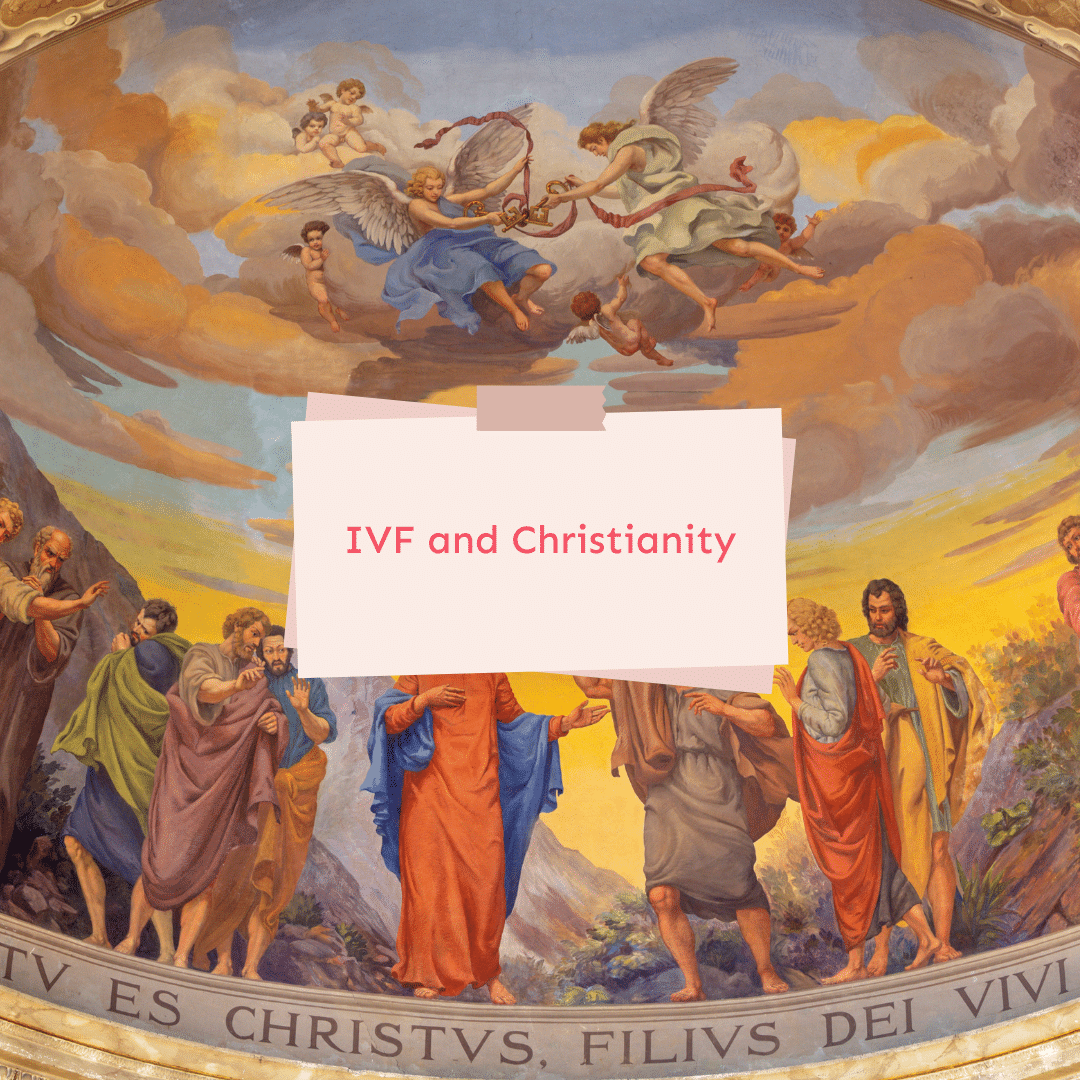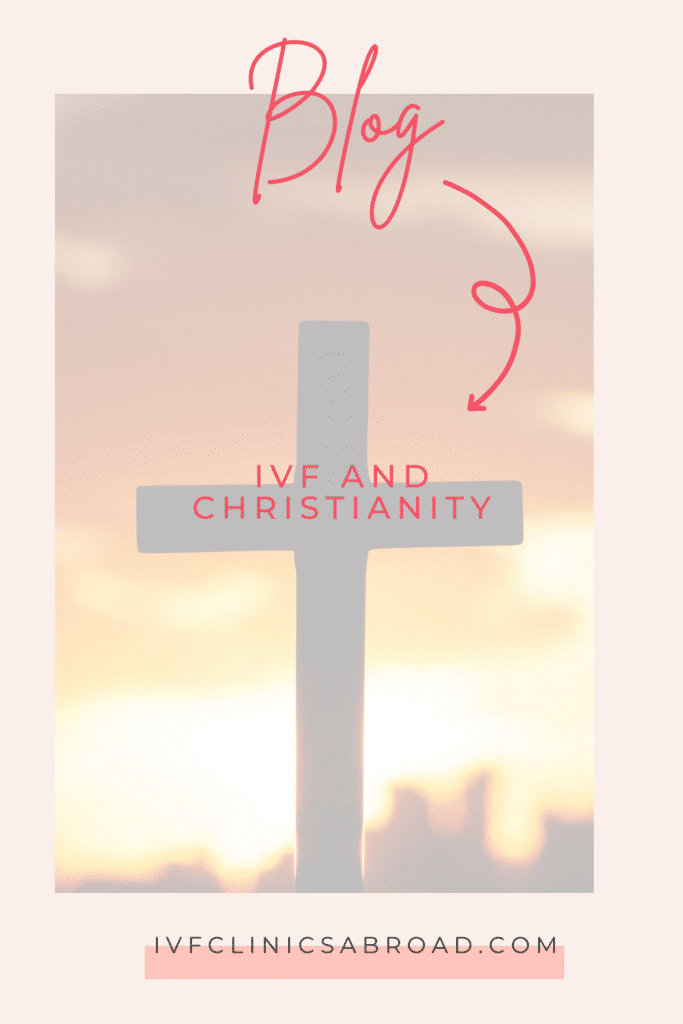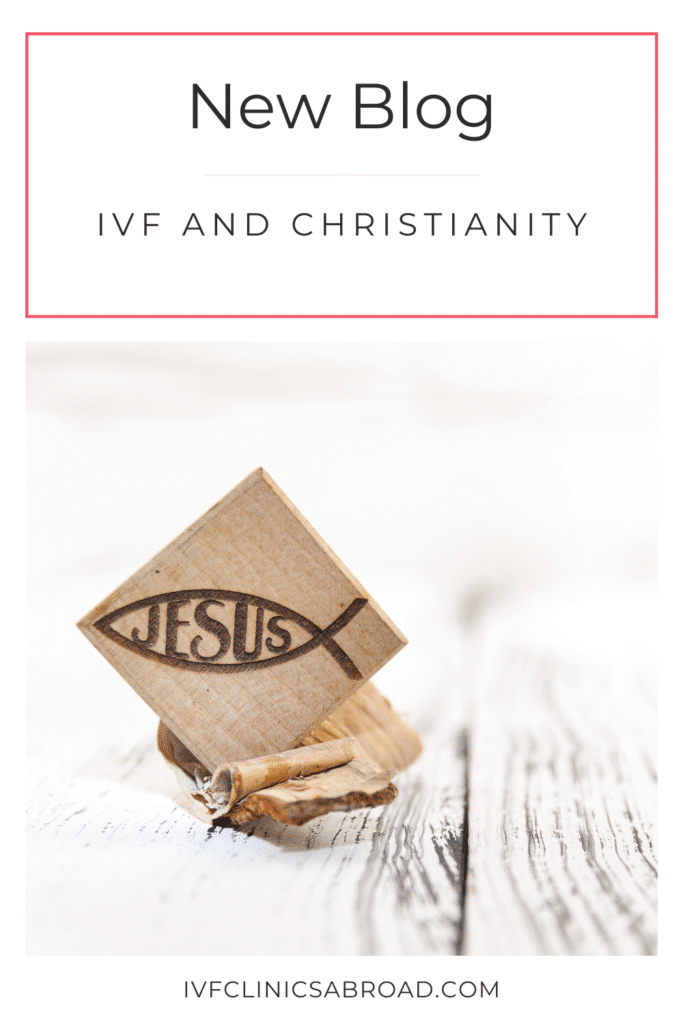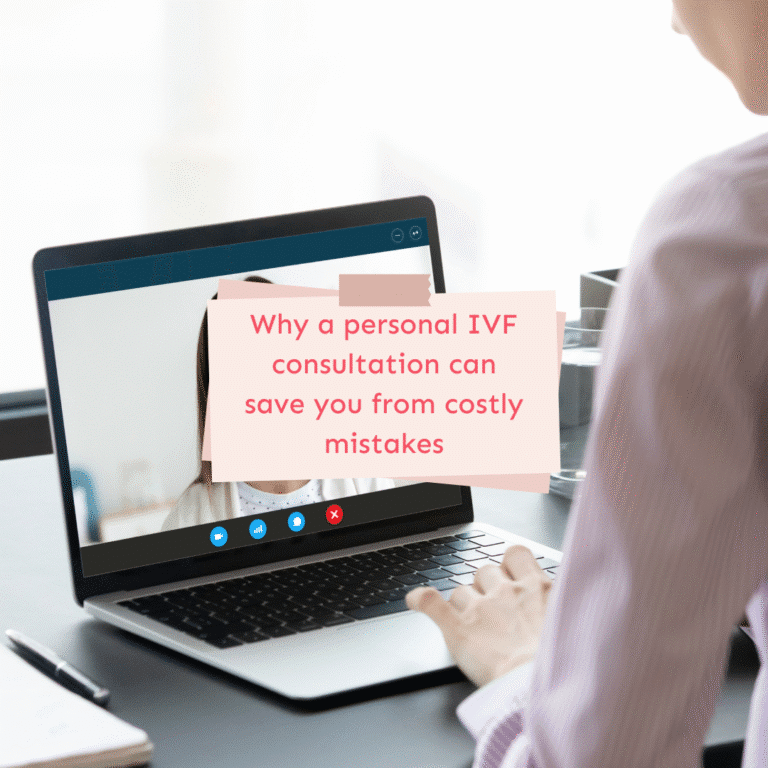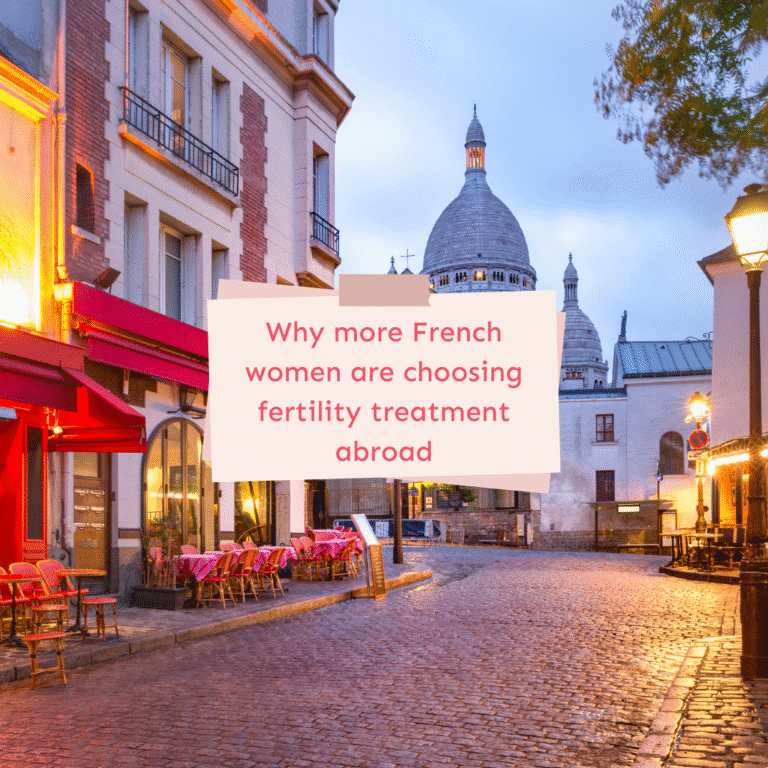In vitro fertilization (IVF) and Christianity: Ethical questions, church views and moral considerations on reproductive technologies
For many couples, IVF brings hope – but also questions. Not just medical ones, but deeply personal and spiritual ones. If you belong to a Christian community and you’re struggling with infertility, you might wonder: Is IVF compatible with my faith? How do different churches respond to the use of reproductive technologies? And what if I still believe that children are a heritage from God – even if I need help to conceive? In this context, the relationship between IVF and Christianity becomes a significant topic worth exploring.
The truth is, there’s no single Christian response to IVF. While some traditions remain silent on IVF or strictly oppose it, others are beginning to offer pastoral support, ethical guidance and space for reflection. Understanding where different churches stand – and how their teachings interpret the moral and ethical questions involved in IVF – can be an important part of your journey.
In this article, we’ll explore how various Christian groups approach assisted fertilization and the IVF process. We’ll look at the most common moral and ethical concerns, including embryo care, genetic testing and conception outside the body. And we’ll reflect on what it means to become pregnant through medical help – not just physically, but spiritually. Because IVF is often more than a treatment. It’s a decision that touches the heart, the body, and for many Christians, the soul.
Understanding the intersection of IVF and Christianity can provide clarity and guidance for those navigating this complex issue.
Understanding how Christianity views IVF and infertility
Infertility has existed since biblical times. The longing to conceive and bear children is woven deeply into scripture, from Sarah and Abraham to Hannah’s tearful prayer. Many Christians today still view the birth of a child as a blessing – and infertility as a profound emotional and spiritual challenge. But modern fertility treatments, especially IVF procedures, raise new ethical and moral questions that weren’t directly addressed in biblical teachings.
This silence on IVF in scripture leaves space for interpretation – and that’s exactly what various Christian groups have done. Some churches see reproductive technologies as incompatible with Christian ethics, while others believe IVF can be morally right in certain circumstances. For couples considering IVF, this diversity can be confusing – but also liberating. It means you are invited into a space of reflection, not just rule-following.
As you reflect on these decisions, consider how IVF and Christianity intersect in your own beliefs and community.
Why infertility raises spiritual and ethical questions
For many Christian couples, infertility brings more than sadness – it brings doubt. Doubt about God’s will. Doubt about the morality of treatment. And doubt about what it means to intervene in something as sacred as conception. The emotional weight is real – especially when the decision involves creating many embryos, freezing or discarding them, or choosing which embryo to implant.
Some ask: Does life begin at conception? Is an embryo a human person? These are not just biological questions – they are deeply spiritual ones. Christian theology often emphasizes that procreation is a divine gift, not a human right. Yet many couples feel torn between their natural desire to become parents and the ethical concerns associated with IVF. This inner tension is why so many Christians pray for healing, seek biblical counsel, or wrestle with what their faith allows when undergoing IVF.
When reproductive technologies become a moral dilemma
IVF is not a single act – it’s a series of decisions. Each step in the IVF cycle carries potential ethical concerns: fertilizing multiple eggs, selecting embryos, freezing or discarding unused ones. The destruction of human embryos is seen by some as morally wrong because it results in the loss of potential life. Others, however, point to the intention behind the treatment: to welcome a child into a loving Christian family.
Some evangelical communities support the process if IVF is used within marriage, without third-party donors, and with care to respect the embryo as early human life. Still, others urge Christians to avoid IVF entirely, arguing that the risks – emotionally, spiritually, and ethically – are too great. What’s clear is this: IVF forces a confrontation with the moral and ethical considerations of human life at its earliest stage. It’s no longer just about whether something works medically, but whether it aligns with Christian values and the dignity of life.
Fertilization, faith and the meaning of life
In Christian thought, the creation of life is never just biology – it is sacred. Fertilization, whether through natural conception or medical assistance, touches on deep questions about purpose, dignity, and the will of God. This is why many Christians who try IVF don’t just ask whether it’s possible – they ask whether it’s right.
The ethics of in vitro fertilization have been debated for decades among Christian theologians. Some view this technology as a compassionate tool to help married couples overcome infertility. Others see it as a human attempt to take control of something only God should ordain. What unites most Christian groups, however, is the belief that life – including the life of the embryo in IVF – deserves respect.
What Christian ethics say about fertilization and embryo care
The IVF process begins when a woman’s egg is fertilized by sperm in a lab – outside the woman’s body. This act of fertilization lies at the heart of the ethical debate. Is it acceptable to create life outside the womb? And what happens to the embryos that aren’t implanted?
Many Christians are concerned about how embryos are treated in the lab. Because multiple eggs are often fertilized, many embryos are created – and not all are used. Some may be frozen, some donated, others discarded. For believers who see embryos as fully human from conception, this raises serious ethical questions. In their view, the frozen embryo is not a medical product – it’s a human life waiting for the mother’s womb.
Yet other Christian groups take a more moderate view. They see the embryo as potential life, not yet a full person. For them, IVF may be morally acceptable if care is taken to avoid the destruction of embryos. Some even support embryo adoption as a way to honour life already created, while offering a path to parenthood for couples unable to conceive naturally.
How the chance of survival influences church positions on IVF
Churches often weigh the moral and ethical considerations of IVF not only through theology, but through outcomes. One common concern is the low chance of survival for embryos created in vitro. Not every embryo implants. Not every IVF cycle results in pregnancy. And many embryos never reach the stage where life outside the womb is even possible.
For those who believe that every embryo is a human person, the failure of an IVF cycle can feel like more than disappointment – it can feel like loss. That’s why some pastors and theologians argue that the entire system of IVF, with its repeated creation and loss of life, contradicts the sanctity of human life. Others, however, view this as a compassionate response to infertility – especially when the alternative is a life without the possibility to conceive a child.
Churches also consider the emotional cost of IVF: the waiting, the grief, the hope. For some, these are reasons to avoid IVF. For others, they are precisely why the Christian community should walk alongside those undergoing IVF – with honesty, humility, and support.
“Trying to conceive with medical help doesn’t mean you’ve lost your values. It means you’re searching for life – with love, with conscience, and with God.”
Nathalie Wiederkehr
The role of the church – from silence to pastoral guidance
For many Christian couples considering IVF, the position of their church matters deeply – not just theologically, but emotionally. They don’t want to make a decision that feels right medically but leaves them spiritually unsettled. And while some churches remain largely silent, others have developed clear guidelines – whether in opposition or support.
Why some pastors support couples who consider IVF
Let’s start with the Roman Catholic Church – the largest Christian denomination worldwide. Its position on IVF is firm: IVF is considered morally wrong because it separates conception from the sexual union of husband and wife, which the Church sees as the only ethically valid setting for the creation of human life. Documents like Dignitas Personae and the Catechism clearly oppose not just IVF, but also sperm and egg donation, surrogacy, embryo freezing and genetic testing. The destruction of embryos and the idea of creating life outside the conjugal act contradict core Catholic principles. Even intrauterine insemination is rejected unless it assists rather than replaces the marital act.
In contrast, many Protestant churches – particularly those in the Evangelical and Reformed traditions – take a more open approach. While some reject sperm or egg donation on moral grounds, IVF using the couple’s own cells is often accepted, especially if the procedure avoids the destruction of embryos. Still, even here the boundaries are not uniform. Ethical concerns rise when selective reduction, PGD, or unused embryos are involved. In general, Protestant ethics tend to emphasise personal conscience, prayer and pastoral support rather than doctrinal bans.
The Anglican Church (Church of England) has evolved significantly. Today, it permits IVF, donor sperm or eggs, and even access for single women and lesbian couples – based on the belief that what matters is the child’s wellbeing and the capacity for “supportive parenting.” The moral status of the embryo is viewed as gradual, not absolute, and reproductive technologies are integrated into the wider concern for justice, inclusion and personal discernment.
Orthodox Christianity takes a different route. While it honours the desire to conceive, it only allows IVF in very limited cases – and strictly within marriage using the couple’s own gametes. Donation and surrogacy are not permitted. Even IVF itself is discouraged unless no other path is possible, and all embryos must be used – without freezing or discarding. The emphasis here is on spiritual integrity and acceptance, often coupled with a strong encouragement toward adoption.
Among smaller Christian groups – including Mormons (LDS), Adventists, Mennonites, and Jehovah’s Witnesses – the approach varies. Most permit fertility treatments if only the couple’s own cells are used. Surplus embryos, third-party donors and surrogacy are generally rejected. Many of these churches offer biblical counsel and prayerful discernment, but without centralised doctrinal enforcement. Personal faith and the desire to honour God’s design for procreation play a guiding role.
When moral and ethical concerns create conflict in faith communities
These varied positions can leave couples caught between science and faith. Some feel fully supported by their church. Others experience silence, shame, or conflicting advice. This is especially true when facing decisions like embryo donation, PGD, or treatments as a single or same-sex couple. In more conservative settings, these choices may be discouraged or even condemned. In more inclusive communities, they are seen as part of modern life – and spiritual support is offered without judgement.
Pastors and church leaders play a critical role. In some places, pastors publicly support couples trying IVF. In others, they counsel them to avoid IVF entirely. But more often than not, couples find themselves navigating a very private space – where church doctrine, personal values and a deep desire to become parents collide.
For many, this becomes not just a medical journey, but a spiritual crossroads. And that’s exactly why clear, compassionate pastoral guidance matters. Because no couple should have to carry the weight of infertility and moral anxiety alone.
Vitro fertilization and reproductive choices in context
When IVF was first introduced, many churches hesitated. The technology was new, ethically complex, and touched on the beginning of human life – a topic deeply rooted in Christian belief. Today, IVF is a common medical option for couples unable to conceive naturally. But for Christians, that doesn’t mean the moral and ethical questions have gone away. In fact, they’ve become even more urgent as reproductive technologies continue to evolve.
Christian ethics have long emphasised the value of life, the importance of the marital bond, and the need to honour the human body. The IVF process, with its laboratory fertilisation, embryo selection and use of donor material, challenges traditional ideas about conception, marriage and the boundaries of human intervention. And yet, many Christians have used IVF – not out of rebellion, but out of hope.
How churches approach IVF in light of marriage and family values
In most Christian traditions, the marital relationship between a man and a woman is considered the ideal context for conception and child-rearing. As a result, many churches only support the IVF process if it takes place within a married couple, using their own sperm and eggs, and without involving third parties or embryo destruction.
The Roman Catholic Church holds this position most firmly. Other churches, particularly in Protestant and Anglican traditions, show more flexibility – some even extending support to single women or same-sex couples. Still, ethical lines are often drawn around practices like surrogacy, anonymous donation, or the disposal of embryos. Even among Christian groups that accept IVF, the emphasis remains on preserving the dignity of life and the sanctity of the family unit.
That’s why some believers choose to limit their IVF treatment options to clinics that align with their spiritual values – avoiding procedures like preimplantation genetic testing or selective embryo reduction. For others, it’s not about strict boundaries, but about discernment: What reflects our understanding of God’s design for life?
Which fertility treatments are compatible with Christian ethics
Not all fertility treatments raise the same concerns. For example, intrauterine insemination (IUI) is sometimes viewed more favourably than IVF, because it more closely resembles natural conception. Others see no moral distinction between different methods of fertilization, as long as they support the couple’s wish to conceive and do not lead to the destruction of embryos.
Preimplantation genetic testing, sperm or egg donation, and embryo freezing, however, often provoke more serious debate – especially when embryos are discarded or donated anonymously. For some Christians, these practices violate the belief that every human embryo deserves to be known, protected and welcomed into a family.
Still, many churches encourage couples to act prayerfully and responsibly. Rather than prescribing a one-size-fits-all response, they urge believers to reflect deeply, seek counsel, and weigh not only the chance of success, but also the spiritual implications of each decision.
Finding clarity – how to move forward with faith and integrity
Making decisions about IVF isn’t only about medical facts – it’s about values, beliefs and conscience. Many Christians facing infertility find themselves navigating a deeply personal space, one where hope and hesitation coexist. The process of IVF can be overwhelming: emotionally, financially and spiritually. But that doesn’t mean it’s wrong. It means it deserves thoughtful, prayerful consideration – and a space to honour both your desire for a child and your desire to stay true to your faith.
There’s no universal Christian answer. But there is room for honest questions, personal reflection and compassionate dialogue – within yourself, with your partner, and perhaps with a trusted pastor or mentor. If you feel unsure, you’re not alone. And if you choose to try IVF, that decision doesn’t mean you’ve lost your values – it means you’re walking through complexity with courage.
What to ask yourself if you’re considering IVF
If you’re thinking about IVF, it can help to pause and ask: Why am I doing this? What does life mean to me – before, during and after conception? Do I understand the full process – from egg retrieval to embryo implantation – and the ethical choices involved?
You might reflect on how many embryos to fertilize, what to do with frozen embryos, or whether to accept donor material. These aren’t just logistical decisions – they’re moral ones. They touch on your views about the beginning of life, the role of medical technology, and your trust in God’s presence through uncertainty. For some, the IVF clinic becomes a place of healing and hope. For others, it’s where hard boundaries must be drawn to remain spiritually at peace.
Ask also: Am I choosing this path out of fear – or out of love? That difference can help shape your entire experience.
How to balance fertility hopes with spiritual beliefs
Balancing your longing to conceive with your spiritual values isn’t easy. But it’s possible. For many Christians, infertility treatments have opened new paths to parenthood – without abandoning their faith. It often comes down to honesty: with yourself, with your faith tradition, and with the complexity of human life.
If you’ve used IVF or are undergoing IVF now, know this – your journey is valid. Your questions are welcome. And your hope is sacred.
Some find peace through embryo adoption. Others pursue adoption after unsuccessful cycles. Some become parents, others do not – but all walk a path shaped by prayer, surrender, and a deep desire to honour life. And that, more than anything, reflects the heart of Christian ethics.
Whether you’re part of a conservative church or a progressive community, clarity comes not from certainty, but from integrity – the willingness to ask hard questions and respond with humility and love.
Ready to take the next step?
If you’re looking into IVF abroad – and want to understand where different treatments are possible and how they align with your values – our Europe IVF Guide can help.
The guide gives you a clear overview of:
- where IVF, donor conception, and embryo donation are legally possible
- what types of treatments are allowed (including gender selection and genetic testing)
- average prices and success rates for IVF in Northern Cyprus
You won’t find vague summaries or marketing claims – just real-world facts, based on years of experience helping women like you compare options across Europe.
No clinic recommendations, no pressure – just clarity, so you can move forward with confidence and peace of heart.
Download your guide today – or reach out for personal support if you’d like help comparing options.


